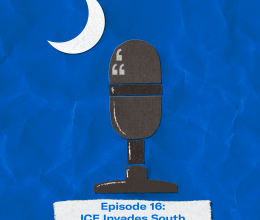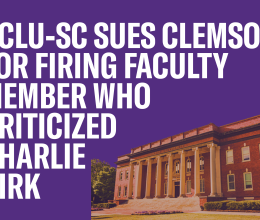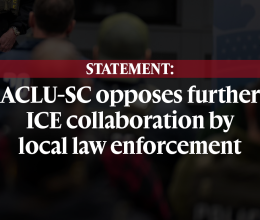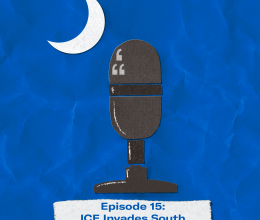
A federal judge has issued a preliminary injunction blocking U.S. Immigration and Customs Enforcement (ICE) and the Department of Homeland Security (DHS) from arresting, detaining, or removing international graduate student Matthew Ariwoola from South Carolina while his case challenging the constitutionality of the government's actions against him continues.
The judge's June 13 opinion is attached. With this preliminary injunction, the court indicates once again that Ariwoola is likely to succeed in his case against DHS and ICE. While his case proceeds, Ariwoola can continue to pursue his studies at the University of South Carolina. For more information and previous filings in this case, see our case page for Ariwoola v. Noem.
“I am grateful for the quick turnaround and massive support from the community, most especially the ACLU-SC and the courts for ensuring that justice prevails,” said University of South Carolina Ph.D. student Matthew Ariwoola, plaintiff in the case. “I believe this will encourage other international students in the same situation to speak up and stand firm for what is right.”
“This ruling is an important acknowledgement that the government's unwarranted, arbitrary, and cruel actions against Matthew and others like him violate the law and cannot stand,” said ACLU of South Carolina Staff Attorney Meredith McPhail. “The district court soundly rejected ICE's argument that the federal government has unbridled authority to revoke, arrest, and deport international students. We live in a nation of laws, and those laws apply to ICE too.”
In the weeks since Ariwoola and thousands of other international students had their student status arbitrarily revoked and then reinstated without explanation, judges across the country in similar cases have found that the legal arguments of ICE and DHS make no sense. In her June 13 opinion, U.S. District Judge Jacquelyn D. Austin cites and agrees with several of those opinions, which stated that the government's line of argument "offends common sense" (Doe v. Noem, out of Virginia), "disregards reality" (Doe #1 v. Noem, out of Illinois), and relies on "semantics" (Isserdasani v. Noem, out of Wisconsin).
Ariwoola is a chemistry student from Nigeria researching ways to make medications more effective and efficient. He also teaches Introduction to Chemistry classes to more than 100 undergraduate students. He was one of thousands of international students across the U.S. who was abruptly informed by his university on April 8 that federal officials had terminated his student status in the Student and Exchange Visitor Information System (SEVIS), meaning that he could not continue his research or teaching. The reason listed for his SEVIS record termination was "OTHER – Individual identified in criminal records check and/or has had their VISA revoked" — but Ariwoola has never been convicted of a crime. To date, ICE and DHS have never explained their actions, which jeopardized Ariwoola's ability to teach, conduct research, pay rent, and provide for his family.
The ACLU of South Carolina filed a lawsuit on behalf of Ariwoola against DHS Secretary Kristi Noem and ICE Acting Director Todd Lyons on April 18. The same day, a federal judge issued a 14-day temporary restraining order so that Ariwoola could “pursue his academic and employment pursuits.” Abruptly and without explanation, Ariwoola's student status was reactivated in SEVIS on the night of April 24.
The court has extended the temporary restraining order three times. The June 13 preliminary injunction blocks the government from taking further action against Ariwoola until the case is decided







